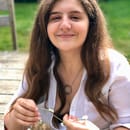Names: Fatimah Asghar & Sam Bailey
Ages: 28 & 29
Job Titles and Descriptions: Artist (Asghar) / Filmmaker (Bailey)
College Name and Major: International Relations and Africana Studies at Brown University (Asghar) / Acting Focus in Theatre (Bailey)
Websites: www.fatimahasghar.com / www.samqbailey.com
Twitter Handles: @asgharthegrouch / @SamQBailey
Instagram Handles: @asgharthegrouch / @samb.chi
Becoming an artist takes a lot of dedication. You may be facing doubts from your family as to whether this a solid career choice or you may struggle with how best to communicate your ideas in a way others can appreciate. Art can make people feel better, make them think critically, and above all, has an impact on how they lead your lives. Being able to create and share art is an honor and privilege.
No one understands that more than Fatimah Asghar and Sam Bailey, creators of Brown Girls, an Emmy-nominated web series. The show explores young women of color navigating their twenties, and had so much buzz after its first season that HBO picked it up for development. Now Fatimah and Sam take us the most important parts of being artists: the ability to tell a story, the necessity of just sitting down and doing work, and finding the collaborators that will truly bring out the best in you.
Her Campus: What does your current job entail? Is there such a thing as a typical day?
Sam Bailey: There is no real typical day, more like a typical couple of weeks here and there. I’m currently in post-production for a short documentary I recently shot in Chicago. I’m working on visual decks for a few projects I’m in pre-production for. And in a couple of weeks, I’ll be traveling to direct on another tv show. My days are always all over the place. I keep one foot in the indie world in Chicago, and the other foot in Hollywood, so the only thing I can count on is that every day will bring something new.
Fatimah Asghar: There’s no typical day for me. I’m an artist, primarily a writer, and my current job consists of a lot of things. I’m currently on a book tour for my debut collection of poems IF THEY COME FOR US, so a lot of my current schedule is filled with travel, performance, and meetings.
Sam Bailey
HC: What is the best part of your job?
SB: The best part of my job is putting a story together, coming up with a visual language that supports either a script I wrote or a script I’ve been entrusted with bringing to life. I love pre-production, I love the planning and building of a story. I love consuming other art as inspiration for my work. I get paid to be a storyteller and that’s pretty f-cking cool.
FA: Creating. I’m really blessed that I get to be an artist. There’s no feeling like when you just finished a poem or when a draft of a screenplay or script leads you to a new discovery.
HC: What was your first entry-level job in your field and how did you get it?
SB: It’s going to sound weird, but I jumped into directing my first gig, so I never really had to do an entry-level position because I was creating my own work. In the beginning, I’d go from directing to being a PA just so I could learn every position on a film set, but that wasn’t a necessity for me.
FA: I worked as a Literary Apprentice for Steppenwolf Theater, and I got it because I applied.
HC: What words of wisdom (well-known quotes, an anecdote from your boss) do you find most valuable?
SB: “Better an asshole than a chicken shit,” was a quote my theatre professor told me back in college. I always thought of that quote in relation to fear. Being fearless, especially as a woman and a black woman in this industry is something that I’m always striving for. Maybe not fearless, because I think we all have fear and that’s a natural thing, but to not let that fear stifle me.
FA: Do your work. Just do your work. There’s no substitute for doing it ever. You have to sit at the table, and you have to wrestle with the thing. There are no shortcuts around it.
Fatimah Asghar by Cassidy Kristiansen
HC: What is one mistake you made along the way and what did you learn from it?
SB: Film is a collaborative art form and 9 times out of 10 I’ve had the pleasure of working with a lot of amazing artists. Every now and then, I’ve allowed someone to work with me and our collaborative practice just didn’t work. For me, it’s about being really specific about how I’m going to create because an imbalance in partnership can really sully a project.
FA: Whenever I don’t trust my gut. There have been people who’ve wanted to work with me or small jobs that I’ve taken because I thought it would be a good experience, but I ignored warning signs in the beginning. Like casual homophobia or racism. I thought that I was being oversensitive or that they were small microaggressions that we could move past, only to have it blow up in my face later. That’s the biggest lesson I learned: to only work with people that I actually really want to work with.
HC: What has been the most surreal moment of your career thus far?
SB: Probably the Emmy nomination [Brown Girls was nominated for Outstanding Short Form Comedy or Drama Series]. That just seemed so outside of my wildest dreams. I don’t even think I was present in the moment, I felt like I was outside of myself watching it all happen.
FA: Being nominated for the Emmy Awards last year was pretty surreal. It was completely unexpected.
HC: What do you look for when considering hiring someone?
SB: I look for people who are independent workers, good problem solvers, and pro-positive communication. So many film sets have a military approach to working and I don’t want my sets to operate that way. So it’s really important to me when I get the chance to put together my crew and heads of departments, that they’re emotionally mature collaborators.
FA: I don’t really hire people. But I collaborate a lot with people. I look for motivation, ability to learn on your own, a unique voice and perspective, and someone who is kind. Really, life is too short to be working with mean people. I can’t overestimate how far basic kindness goes, and how that makes people want to work with you.
HC: What advice would you give to a 20-something with similar aspirations?
SB: Make your work. Make it with your peers. Focus on the doing and the making, don’t focus on the fame aspect of it. Get really intimate with why you’re making work. Because there will be people and opportunities that reveal themselves to you who will challenge your inner artist and I think it’s important that we get really concrete and honest with ourselves as to why we’re doing what we’re doing so we can be confident in those choices.
FA: No one else’s journey will be yours. That’s my advice. As an artist, there’s no one path. And you’re going to do it differently than anyone else and that’s okay. In fact, that’s great.
HC: What’s the one thing that’s stood out to you the most in a resume?
SB: Anything that shows initiative. I’m interested in people putting themselves out there.
FA: In writing and art, I think clarity of voice and vision. You can tell when something is authentic, versus when someone is just biting or copying someone.


